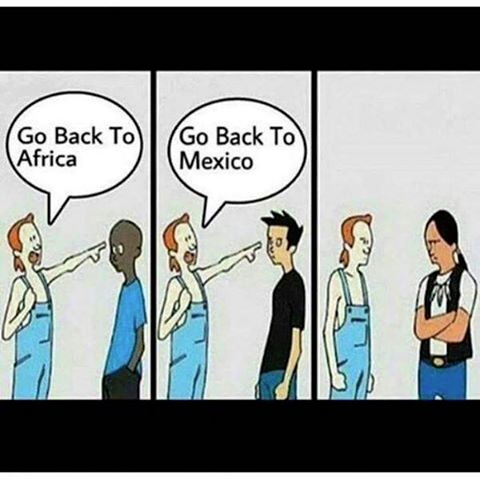Race, Rhetoric and Those “Racist Bones”
6July 20, 2019 by Jean
 Recently I’ve been reflecting on President Trump’s suggestion to four women lawmakers that they should “go back to the … countries from which they came” and on both his and Joe Biden’s claims that they “don’t have a racist bone” in their bodies. I was already planning to write about this when I heard an interview with Ibram X. Kendi of American University’s Antiracist Research and Policy Center that helped to clarify my thinking.
Recently I’ve been reflecting on President Trump’s suggestion to four women lawmakers that they should “go back to the … countries from which they came” and on both his and Joe Biden’s claims that they “don’t have a racist bone” in their bodies. I was already planning to write about this when I heard an interview with Ibram X. Kendi of American University’s Antiracist Research and Policy Center that helped to clarify my thinking.
I want to start with that claim about “racist bones.” To make sense of it, we need to consider the meanings of the term “racist.” In his interview, Kendi distinguished between the use of the term racist to describe a person (“He’s a racist”), which seems to see racism as part of a person’s essence, and the use of the term “racist” to describe ideas and assumptions or actions and policies. Notice the slippage between these two meanings of “racist” when some people characterized Trump’s words as racist and others defended him by saying, “The President is not a racist.” When Biden and then Trump declared “I don’t have a racist bone in my body,” they were assuming that “racist” describes a person’s essence and they were saying, “I’m not that type of evil, bigoted person.”
I’m from the school that uses the word “racist” to characterize ideas and actions, not persons. Racist ideas and assumptions are those that define some groups as inferior to others on the basis of their race or ethnicity. Racist actions and policies are those that create discrimination against racial and ethnic groups. In this reading of “racist,” racist ideas and assumptions are racist even if they are not conscious and racist actions and policies are racist even if discrimination is not their primary intention. Much of the racism in our society is a result of implicit bias, assumptions built into our ideas, actions and policies that we are not consciously aware of.
When I heard Biden and Trump make that claim about their lack of racist bones, I wondered how two men in positions of leadership could be so clueless about the workings of racism, privilege and implicit bias. I think the answer is what the feminist artist Judy Chicago has called “the will to be dense,” an active resistance to learning things that will challenge your understanding of yourself and your life. “The will to be dense” is an expression of privilege, a way of hanging on to the comforts of privilege while pretending not to. If only those who are always and everywhere consciously and intentionally racist can have racist ideas or engage in racist behaviors, most of us are off the hook.
I know I have racist bones in my body, by which I mean that I have deep-seated assumptions that bias me against people of some racial and ethnic groups. I’ve taken a number of implicit bias tests at the website of Project Implicit. These tests are quick and easy to take, and their genius lies in the fact that they don’t measure your conscious assumptions or biases about various social groups. Rather, they tap into your unconscious (implicit) biases by simply measuring whether it takes your brain longer to make positive associations with some groups than with other groups. I wasn’t surprised the first time I took such a test and learned that I have a moderate bias against African Americans. I was surprised when another test revealed that I have a much stronger bias against Latin Americans. Once I was aware of it, though, I could see the ways that bias had played out in my interactions with (and avoidance of interaction with) Latin Americans I had encountered. Do these biases make me a bad person? No; they make me a person who was raised in a culture that is permeated with racist assumptions. Being aware of these biases may make me uncomfortable, but awareness also makes it possible for me to consciously resist those biases. The antidote for implicit bias is to make it explicit, something both Donald Trump and Joe Biden are avoiding when they assert that they “don’t have a racist bone” in their bodies.
I want to turn now to the content of President Trump’s attacks on the four congresswomen and the assumptions embedded in those attacks. He has deployed two familiar tropes of American culture, beginning with the “go back to where you came from” trope and then backing off to the “love it or leave it” trope. The “go back to where you came from” trope is pretty obviously racist, since it is always used against members of racial and ethnic groups that are assumed not to be “real Americans.” This idea has a long history in our country. Many abolitionists before and after the Civil War thought that the way to erase the evil of slavery was to send enslaved peoples “back to Africa” (a place that few of them had ever been to). Given the history of the slave trade, the enslaved peoples had often been in this country for more generations than the whites who were proposing to “send them back to where they came from.”
The “love it or leave it” trope seems to avoid these racist assumptions. (Those of us of an age to have protested the war in Vietnam remember it being used against us, even if we were white.) But when we look more closely, it turns out that this trope, too, includes an assumption that some are real Americans who truly belong, while others are lucky to be here and should be uncritically grateful. Those who deploy the “love it or leave it” trope always exempt themselves; their criticisms and calls for change are tough-love expressions of patriotism designed to put the country back on the “right” track. Donald Trump has a long history of criticizing this country; his whole presidential campaign was based on the assumption that the country was in a sorry state and had lost its former greatness. He didn’t think the appropriate response to these criticisms was to leave and go live at one of his properties in another country if he couldn’t love this country as it was; he thought the appropriate response was to run for office and try to change things. (Wait. Isn’t that also what those congresswomen have done?) Since he truly “belonged” in this country, he had a right to criticize it. (Indeed, his long campaign to deny Barack Obama’s citizenship was a way of saying it was the elected President who didn’t belong.) More often than we would like to admit, our assumptions of who really belongs and has a right to criticize are based on race and ethnicity.
I want to encourage everybody who is reading this to head on over to Project Implicit and take one or more tests of implicit bias. You have nothing to lose but some of your unconscious racist assumptions.


In my opinion, we all have racial bias’s that have been built into our culture. However, many of us recognize that these are and have been a part of our society for a long time and we actively try not act upon them in our personal lives or to pass them onto the next generation. Before Obama was elected president I thought we were doing better and better with each new generation but his election seemed to light a fire under the hardcore racists who are making a last stand (a least I hope it’s a last stand) to hold onto their illusions that we are a nation of all White Christians.
Trump is the most disgusting person we could have elected. He tries to divide us on any front he can. Don’t get me started!
Jean, I agree that we have all learned biases against denigrated groups (including groups that we are part of!) and that recognizing those biases is the first step toward questioning them and actively rejecting them. Doing that is hard work, though, and I think many people would rather just pretend they’re not part of the problem. Hanging on to a definition of racist that makes it a characteristic of bad people is one way of pretending.
The conscious and intentional white supremacists are a whole other matter. It may be that the best we can do is contain them by not granting any legitimacy to their beliefs and behaviors. It upsets me to have a President who repeatedly legitimizes racism. The 2020 election will be a test of how resolved the majority is to repudiate racism.
This is really excellent, Jean, and should be reprinted in major newspapers. One of the things that I have told my sociology classes is that growing up in this country makes it really difficult not to be racist (as you point out). Becoming consciously tolerant is much easier than changing deep-seated emotional reactions (Malcolm Gladwell has interesting things to say about this, similar to your comments on the test you can take). And of course, as you say, structural racism is the biggest problem. I just watched “On the Basis of Sex” about Ruth Bader Ginsburg, which is fascinating about structural gender bias.
Thanks, Charlie. Can you point me in the direction of the Malcolm Gladwell book in which he addresses racism? I haven’t seen On the Basis of Sex yet, but I’m looking forward to it.
This is a thoughtfully written article, Jean, and I applaud you for tackling this topic. I clicked the Project Implicit link and did a number of the tests. The tests provide an interesting way of getting at unconscious biases.
Jude
[…] questions, I think we have to return to something I’ve written about before, implicit bias (see Race, Rhetoric and Those “Racist Bones”). Implicit biases are (mostly negative) stereotypes that we have about people different from us […]